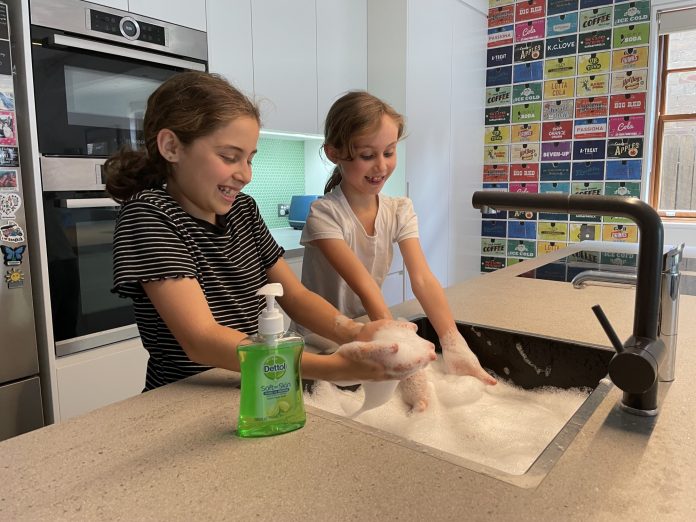We all know how important good hand hygiene habits are in helping to curb the spread of germs and viruses.
But many of us – parents, children, teachers – may still be unsure when it comes to knowing when to wash hands properly.
To help bridge the hand hygiene knowledge gap, this Global Hand Washing Day (15 October), Dettol has developed a play-based program – ‘Catch a Habit’ – to get more children to adopt good hand hygiene habits and help stop the spread of germs.
Research from the Global Hygiene Council has identified that some teachers, parents and children do not have an adequate understanding of the importance of hygiene and how to wash hands properly.1
- Almost half (45%) of Australian primary school children do not always use soap when washing their hands at school.2
- More than 1 in 3 (36%) haven’t learnt how to wash their hands at school at all.2
- More than 1 in 4 (26%) Australian parents and teachers do not know when their children should wash their hands with soap and water.2
Furthermore, neuroscience research shows that play enhances children’s development and ability to learn new skills.3
So, harnessing the power of play, Dettol has developed a dedicated ‘Catch a Habit’ program designed to teach children to improve their hand hygiene and help stop the spread of germs.
To help more than one million Aussie kids learn healthy habits, the innovative program encompasses a new handwashing song, a new hygiene school curriculum “Hygiene Quest,” and as part of its partnership with the Sydney Opera House, it will offer interactive experiential learning that will be housed at the Opera House.
Child Psychologist Dr Kimberley O’Brien says making learning more fun will help hygiene practices resonate with young Australians.
“Covid has significantly altered our regular routines, even more so for kids who do not yet understand why these changes are happening.
“Play is an incredible tool that can build the cognitive skills of good hygiene habits at home and school, whilst also giving parents and teachers opportunities to set foundational habits needed as the country and schools open back up.3
“By harnessing the power of play through engaging and imaginative activities, children will develop a lifetime of hygiene habits in a nurturing and interactive environment3, ultimately improving recall and embedding these behaviours more permanently,” says Dr O’Brien.
The new program includes Hygiene Quest, a global schools program developed by leading educational partners that educates children on the importance of hygiene via gamification, comic books, activity sheets and more.
Hygiene Quest will be available to classrooms across the country from January 2022, as well as for parents to access at home.
Marketing Director at Reckitt Health AU, Henry Turgoose says: “Communicating important hygiene messages in a language kids can understand – through play and creativity – is critical to helping stop the spread of germs and improving hygiene outcomes in the community.
“Through the Catch a Habit program, we’re aiming to reach one million children in year one to improve hygiene literacy and create lifelong behaviours that are intrinsically ingrained into their psyche.”
In addition to Hygiene Quest, the Catch a Habit program includes a multi-lingual handwashing jingle, available in English, Mandarin and Arabic, as well as the recently announced partnership with the Sydney Opera House.
Through the two-year partnership Dettol will provide creative and educational experiences in Sydney Opera House’s new purpose-built Centre for Creativity, due to open early next year, as well as free, participatory Creative Play workshops and other events for kids and families in school holidays.
For more information on Catch a Habit or Dettol, and to access Hygiene Quest visit: dettol.com.au/catch-a-habit/
References:
[1] “Hygiene Behaviour Change: Embedding behaviour change at the heart of RB’s purpose strategy”, Report by Global Hygiene Council and Ipsos. 525 Australian parents were surveyed as part of this report. Survey completed May 2020.
[2] Hygiene Behaviour Change: Embedding behaviour change at the heart of RB’s purpose strategy”, Report by Global Hygiene Council and Ipsos, p.22. 525 Australian parents were surveyed as part of this report. Survey completed May 2020.
[3] The Power of Play, Paediatrics Journal, pediatrics.aappublications.org/content/142/3/e20182058







